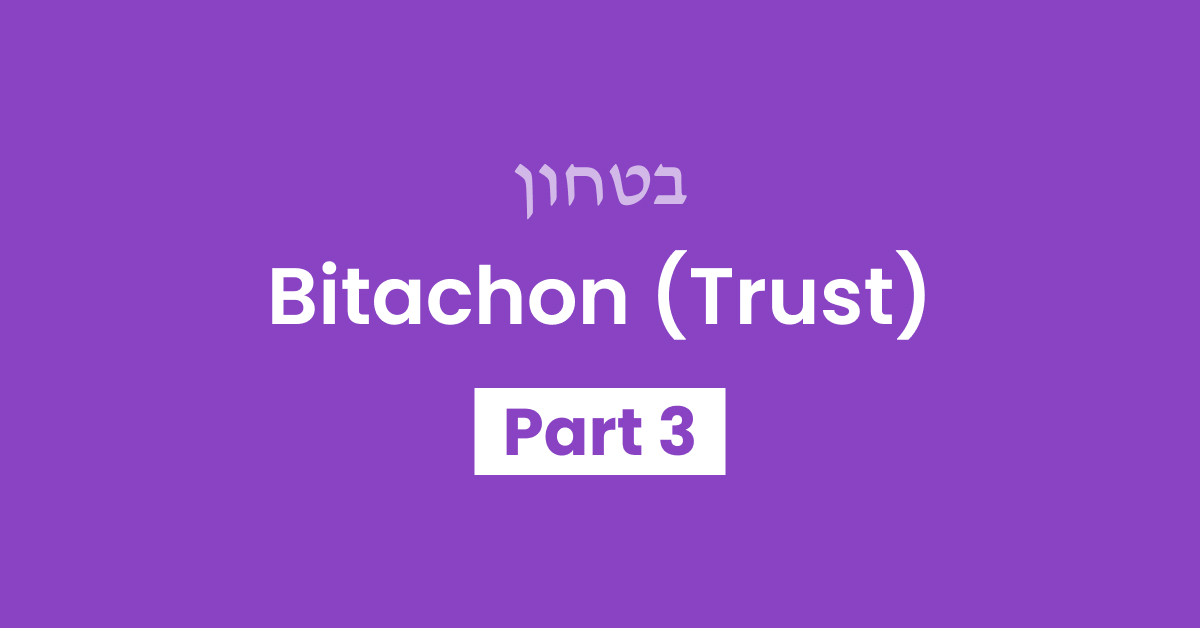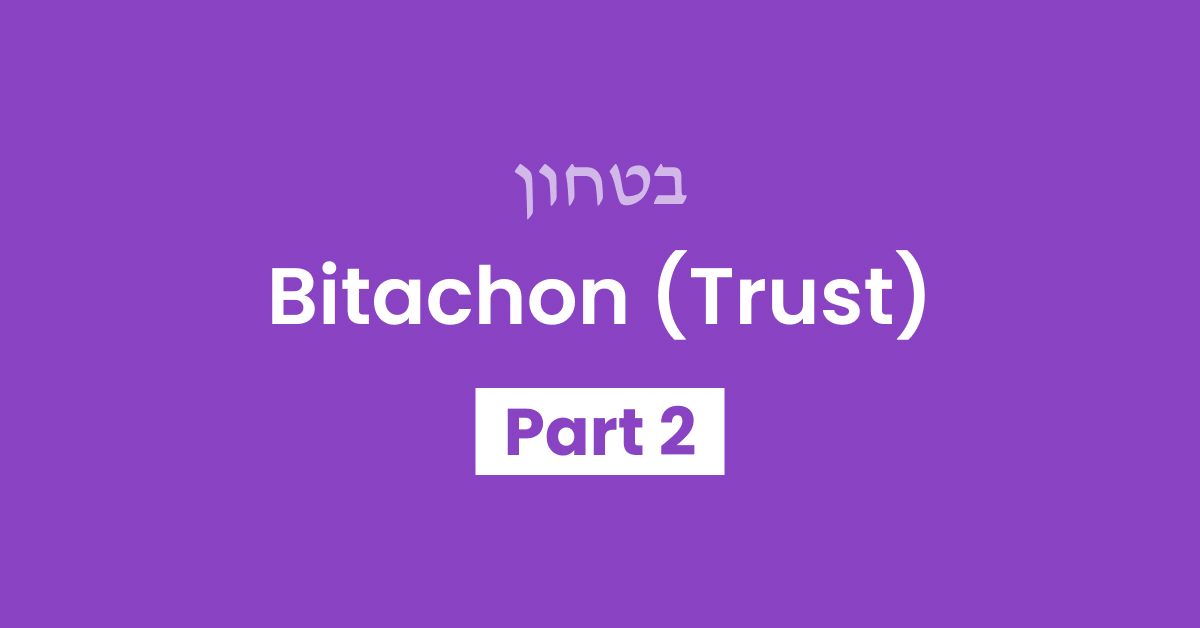Tonight begins the month of Iyar… a pretty quiet month compared to the last busy month of Nissan. What should we be thinking about during this month?
The Shem MiShmuel1 writes that Iyar is actually very much connected to Nissan. Since Nissan is the first* month in the Jewish calendar, Nissan is parallel to Reuven, the first of the 12 tribes. The name “Reuven” is derived from the Hebrew word for seeing, as Leah said: “I will call him Reuven, because Hashem has seen (ra’ah) my affliction.”2 In Nissan, on Pesach, the Jewish people “saw” clearly that Hashem was in control of nature through the 10 plagues and miraculous splitting of the sea. Clearly, a G-d who is able to change nature in these ways is very much in control of what happens in this world.
By contrast, Iyar – the 2nd month of the year – is parallel to Shimon, the 2nd tribe. Shimon comes from the same root as “Shema” (hearing).3
What’s the difference between seeing and hearing?
Seeing only happens up close, but hearing can be even from afar. You can see your friend when he’s standing in front of you, but if he walks far away – or hides behind a tree – you won’t be able to see him anymore. But when it comes to hearing, distance is much less of a factor; you can hear a clap of thunder or fireworks from many miles away! Or if you’re playing hide and seek with your little niece, and she’s giggling as she hides under the table… you know she’s there. You can’t see her, but you KNOW she’s there, because you can hear her.
The same holds true when it comes to recognizing Hashem’s power. It’s easy to recognize that Hashem is all-powerful when we can “see” Him up close, as we did in Nissan, through the miracles of the Exodus. When Hashem does miracles, it’s easy to see that Hashem is pulling the strings behind the cloak of nature. But in everyday life, Hashem is totally hidden, and it is much harder to “see” Him! It looks like the flowers are growing on their own, the car’s wheels are turning due to some law in physics, and apples are falling from the tree because of gravity. Where is Hashem in everyday life? It’s so hard to see His involvement!
During Iyar, we need to tap into our skill of “hearing” to find Hashem. Just as you know your niece is hiding under the table when you hear her giggling, we can know that Hashem is here when we “listen” to all the clues and hints that He gives us.
During Iyar, we need to tap into our skill of “hearing” to find Hashem.
How do we know that Hashem is in control of everything? The Ramban4 writes that the whole purpose of the miracles in Egypt was to teach us that the same G-d who did miracles back then in Egypt, is still involved in our personal lives today. From the fact that G-d “proved” His power through the miracles in Egypt, we can rest assured that He can manipulate nature today, too. His presence and involvement may be more hidden, but He is still pulling the strings behind the cloak of nature.
The Ramban writes that the whole purpose of the miracles in Egypt was to teach us that the same G-d who did miracles back then in Egypt, is still involved in our personal lives today.
This is where the work of Bitachon comes in. Bitachon means seeing Hashem even when He is hidden behind the mask of nature. It might look like the flowers are growing on their own, the car wheels are turning on their own… but in truth, they are only growing and moving because Hashem is moving them.
Bitachon means understanding that every single thing happens in this world ONLY because Hashem wants it to happen and that Hashem is the ONLY driving Force behind everything.5 Nothing can happen without Hashem wanting it to happen.
Bitachon means understanding that every single thing happens in this world ONLY because Hashem wants it to happen and that Hashem is the ONLY driving Force behind everything.
Wait – What does that mean?
I thought that apples fall from the tree because of gravity? I thought I can walk across the room by myself, on my own two feet? What do you mean that Hashem is the ONLY force behind everything?
Visualizing How Hashem Has Total Control
In order to better understand what it means that Hashem is the only Power in the world, we can use the analogy of a dream: Imagine that one night, while you are asleep, you dream of two people – Joe and Shmoe. Joe is a successful businessman and has millions of dollars. Shmoe is 6’5 tall and has massive muscles. Everyone is afraid of Shmoe for his strength and power, and eager to please Joe for his wealth and influence.
What happens when you wake up from the dream? Suddenly, they cease to exist. No matter how strong Shmoe was, or how smart and wealthy Joe was, it doesn’t make a difference. Joe and Shmoe only have “power” and intelligence as long as they live in your imagination. Their strength, their existence, and their every movement is dependent entirely on you.
The same is true with us and Hashem. Although it’s impossible for us to fully understand, Hashem is the only “real” existence. As we say every morning in Adon Olam, Hashem existed even before this world was ever created – just as a person exists before his dream exists. We are like a figment of Hashem’s imagination. It feels like we are real, but in truth, we only exist as long as Hashem is thinking about us. If Hashem would stop thinking about us for even one second, we would immediately disappear! Similarly, every move thought and action that we do, is guided and powered only by Hashem.
We cannot move without Hashem. We cannot breathe without Hashem. We cannot exist without Hashem.
We cannot move without Hashem. We cannot breathe without Hashem. We cannot exist without Hashem.
It’s the Small Stuff That Counts
Bitachon is not just about trusting in Hashem to help with the big things in life – healing someone from a critical illness, or saving someone from a car crash. In desperate situations like these, a person will naturally cry out to Hashem, because they finally realize they have no where else to turn.
Yes, it’s important to trust in Hashem in times of dire need. But the Sifsei Chaim6 actually says that the main work of bitachon is with the small things.
Before you go to school or enter the Beis Medresh, ask Hashem to help you learn well. Before you go to the store, ask Hashem to help you buy what you need, at a good price. Before you drive to work, ask Hashem to help you get there quickly and safely.
If we want to be able to trust in Hashem when faced with bigger challenges, we need to practice by trusting in Him when we’re faced with the smaller challenges.
The more we practice turning to Hashem for help with the small things, the more we will realize that Hashem is in control of every single aspect of our lives.
The more we practice turning to Hashem for help with the small things, the more we will realize that Hashem is in control of every single aspect of our lives.
Sources: [1] Kedoshim 674; [2] Bereishis 29:32; [3] Bereishis 29:33; [4] Shemos 13:16; [5] Sefer Emunah U’Bitachon of the Chazon Ish 2:1; [6] Sifsei Chaim: Middos V’Avodas Hashem Vol. 1. pg. 507
Your Challenge
Once a day, before doing something “ordinary” –
1) SAY out loud (or whisper) that you realize this is in Hashem’s control; and
2) ASK Hashem for help
FOR EXAMPLE:
- Before walking up the stairs, say: “Hashem, I know I can’t walk up the stairs unless You give me the energy and balance to do so. Please help me get up the stairs.”
- Before crossing the street, say: “Hashem, I know I can’t cross the street unless You give me the vision to notice cars coming. Please help me cross the street safely.”
- Before driving, say: “Hashem, I know I can’t drive properly unless You give me the intelligence and skill to do so. Please help me drive safely.
- Before speaking/writing say: “Hashem, I know that I can’t speak/write unless You give me the intelligence to do so. Please help me say/write the right thing.”
Torah Questions
- It says in Tehillim (40:5): “Fortunate is the man who places his trust in Hashem.” The Midrash says that this refers to a specific person who had a very high level of trust in Hashem. Who was this person? (See Bereishis Rabbah 89:3)
- What did this person do or say, to demonstrate his complete trust in Hashem? (See Bereishis 41:16 with Rashi OR Bereishis 39:3 with Rashi)
- When did this person make a slight error in where he chose to place his trust? (See Bereishis 40:14 and Rashi on Bereishis 40:23)
- How was he punished for this mistake? (See sources above)
- It says in Devarim (Chapter 8) that when the Jewish people are successful and wealthy, they are in danger of becoming haughty and forgetting Hashem. What might we erroneously believe in our hearts when we are feeling successful?
- Which animal in Perek Shira says: “Trust in Hashem forever…” (Yeshaya 26:4)
- It says in Yirmiyahu 17:8 that a person who trusts in Hashem is compared to something in nature. What is he compared to?
Questions to Ponder
- How can developing bitachon help you avoid feeling jealous of other people?
- How can developing bitachon help you avoid feeling angry?
- If Hashem controls everything that happens in this world, does that include things done by people? If a thief steals money from someone’s house (chas veshalom), did Hashem make that happen too? Or is it the thief’s fault for choosing to steal? Is there a contradiction?
- Who are some people in your life whom you trust? What qualities make them trustworthy?
- The Chovos HaLevavos enumerates 7 factors that help us trust other people. What are they?
- The mazal (astrological sign) of Nissan is a sheep, and the mazal of Iyar is an ox. How is this related to the need to work on bitachon during Iyar? (See the Shem MiShmuel included in the PDF)





